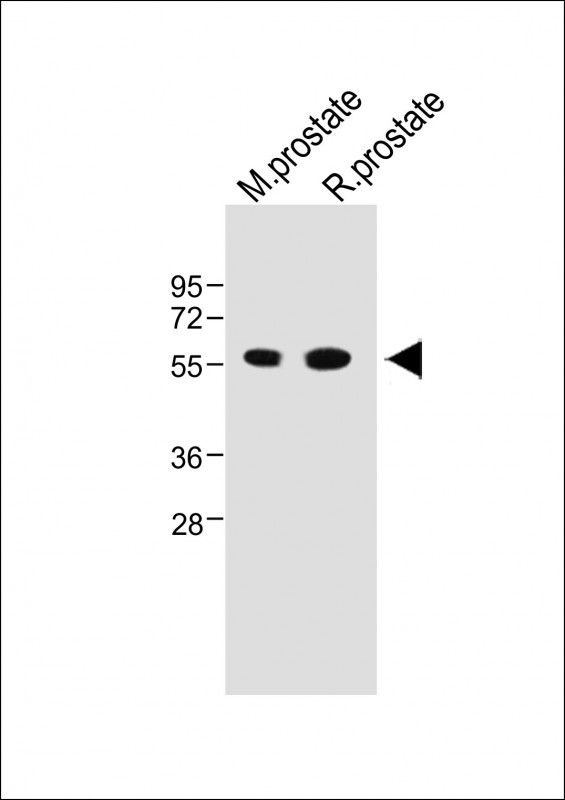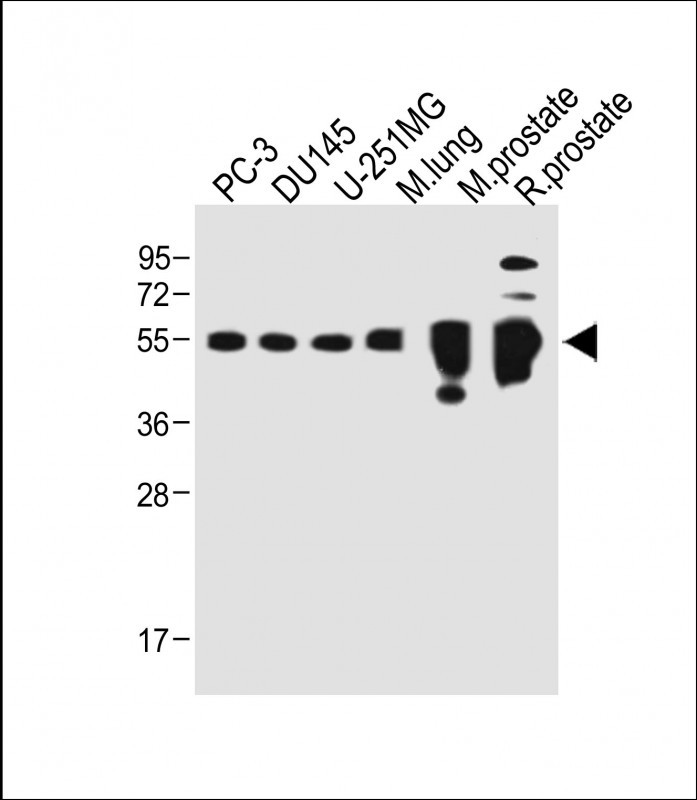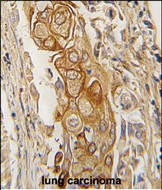


| WB | 咨询技术 | Human,Mouse,Rat |
| IF | 咨询技术 | Human,Mouse,Rat |
| IHC | 1/100-1/500 | Human,Mouse,Rat |
| ICC | 技术咨询 | Human,Mouse,Rat |
| FCM | 咨询技术 | Human,Mouse,Rat |
| Elisa | 咨询技术 | Human,Mouse,Rat |
| Aliases | Prostatic acid phosphatase, PAP, 5'-nucleotidase, 5'-NT, Ecto-5'-nucleotidase, Thiamine monophosphatase, TMPase, PAPf39, ACPP |
| Entrez GeneID | 55 |
| WB Predicted band size | 44.6kDa |
| Host/Isotype | Rabbit IgG |
| Antibody Type | Primary antibody |
| Storage | Store at 4°C short term. Aliquot and store at -20°C long term. Avoid freeze/thaw cycles. |
| Species Reactivity | Human, Mouse, Rat |
| Immunogen | This ACPP antibody is generated from rabbits immunized with a KLH conjugated synthetic peptide between 313-341 amino acids from the C-terminal region of human ACPP. |
| Formulation | Purified antibody in PBS with 0.05% sodium azide,1%BSA and 50% glycerol.prepared by Saturated Ammonium Sulfate (SAS) . |
+ +
以下是关于ACPP(前列腺酸性磷酸酶)抗体的3篇参考文献的简要列举:
---
1. **文献名称**:Prostatic acid phosphatase (PAP) antibody-guided imaging of prostate cancer
**作者**:Liu H, et al.
**摘要**:该研究开发了一种靶向PAP的单克隆抗体,用于前列腺癌的分子影像学检测。实验显示抗体在体外和动物模型中特异性结合肿瘤组织,为无创诊断提供了潜在工具。
---
2. **文献名称**:Autoantibodies to prostatic acid phosphatase in prostate cancer patients
**作者**:Somers WJ, et al.
**摘要**:研究检测了前列腺癌患者血清中抗PAP自身抗体的水平,发现其与疾病分期相关,提示其可能作为预后标志物或免疫治疗靶点。
---
3. **文献名称**:Dual-targeted nanoparticles coated with anti-PAP antibody enhance drug delivery to prostate tumors
**作者**:Zhang Y, et al.
**摘要**:通过将抗PAP抗体与纳米颗粒结合,构建了靶向递药系统,显著提高了化疗药物在前列腺肿瘤中的富集度,并减少对正常组织的毒性。
---
注:以上文献信息为示例性内容,实际研究中建议通过PubMed或Web of Science核对具体文献。
ACPP (Acid Phosphatase, Prostate), also known as prostatic acid phosphatase (PAP), is a glycoprotein enzyme predominantly expressed in prostate epithelial cells. Historically, it served as a key biomarker for prostate cancer diagnosis before the widespread use of prostate-specific antigen (PSA). ACPP plays a role in phosphate metabolism and is secreted into seminal fluid. In clinical contexts, elevated ACPP levels in serum were linked to metastatic prostate cancer, particularly in bone metastases.
ACPP antibodies are immunological tools targeting this enzyme, widely utilized in research and diagnostics. They enable detection of ACPP expression in tissues (via immunohistochemistry) or bodily fluids (via ELISA), aiding in prostate cancer studies, disease monitoring, and understanding biochemical pathways. Recent research explores ACPP's immunomodulatory roles, including its potential as a therapeutic target or vaccine component (e.g., in sipuleucel-T immunotherapy). Antibodies against ACPP also help investigate its interactions with cellular receptors and its ambiguous roles in pain signaling and tumor microenvironments. Despite reduced diagnostic use post-PSA adoption, ACPP remains relevant in metastatic disease research and emerging therapeutic strategies.
×